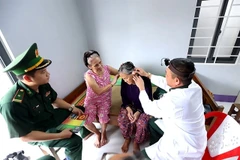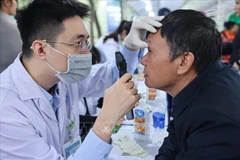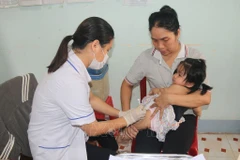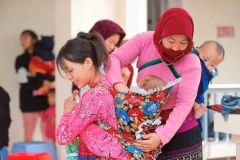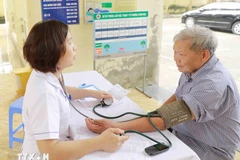Hanoi (VNA) – Vietnam is turning its commitment into concrete action, translating investments and initiatives into real results that benefit tuberculosis (TB) patients and drive effective interventions. With a comprehensive approach, the country is determined to eliminate TB as a public health threat by 2035.
The message was underscored by Dr. Dinh Van Luong, Director of the National Lung Hospital and head of the steering board for the National TB Control Programme, at a ceremony marking World Tuberculosis Day (March 24) and an annual review conference on TB prevention efforts in 2024.
Speaking at the event, Deputy Minister of Health Tran Van Thuan acknowledged Vietnam’s remarkable progress in TB control but emphasised that the country remains among the 30 nations with the highest TB and multidrug-resistant TB (MDR-TB) burden worldwide. In 2024 alone, more than 113,600 TB cases were detected, including nearly 4,000 cases of MDR-TB.
"Despite persistent challenges, Vietnam has achieved significant results in TB control. Our TB prevention network now covers 100% of communes and wards, ensuring universal access to TB care. The success rate for treating new and relapsed TB cases remains high, at nearly 90%. Moreover, 2024 saw the decisive implementation of new technical guidelines from the Ministry of Health to enhance early and accurate TB detection," Thuan added.
A key highlight of 2024 was the continued success of the "Winning TB" support fund, which received overwhelming public support. Tens of thousands of text messages were sent in solidarity, and over 2,300 underprivileged TB patients received financial aid.
Last year, the National TB Control Programme achieved its best-ever results, with a 7% increase in the TB case detection compared to 2023, and a treatment success rate surpassing 90%, exceeding the global average of 88%.
Jennifer Horton, Deputy Representative of the World Health Organisation (WHO) in Vietnam, reaffirmed the urgency of eliminating TB, still the world’s deadliest infectious disease. She highlighted that this matches the Vietnamese Government’s national anti-TB strategy to end TB as a public health issue by 2035.
The WHO commended Vietnam’s proactive measures in identifying and treating TB patients while ensuring that medical costs remain largely covered by the national health insurance system, significantly easing the financial burden on patients.
Following the Prime Minister’s Directive No. 25 on strengthening TB prevention and control efforts, numerous localities, organisations, and institutions have launched proactive TB detection programmes, public health campaigns, and community engagement initiatives. These efforts aim to enhance public awareness and encourage active participation in TB prevention.
Despite notable achievements, Dr. Luong emphasised that challenges remain. The proactive detection rate of TB among high-risk groups still falls short of targets, and the treatment success rate for bacteriologically confirmed pulmonary TB cases has yet to reach desired levels. Moreover, financial resources, particularly international funding, are declining, while complex procurement procedures for medical supplies and equipment continue to hinder TB detection and treatment efforts.
To ensure the long-term success of TB control efforts, the National TB Control Programme has proposed the Government to allow grant-funded projects from foreign governments and international organisations to be implemented under a streamlined, specialised framework. Additionally, it advocates nationwide health screenings using an integrated electronic health record system to facilitate TB detection and treatment.
The programme also urged the Government to prioritise sustainable domestic investment through the state budget and health insurance to maintain and expand TB control initiatives.
Deputy Minister Thuan called on the entire health sector, local authorities, and partners to continue to adopt advanced technical solutions, enhance early TB detection, and improve the management of TB and MDR-TB cases. Special attention must be given to high-risk groups, including the elderly, children, individuals with chronic illnesses, and those in closed environments.
To support these efforts, the Ministry of Health has stressed the need for sustainable financial resources from central and local budgets, health insurance, and the private sector. It also called for fostering public-private partnerships and global support to upgrade facilities and strengthen the TB prevention network./.






